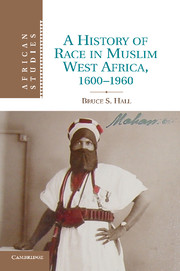Book contents
- Frontmatter
- Contents
- List of maps and figures
- Acknowledgments
- Note on orthography
- Abbreviations used in references
- Glossary
- Introduction
- PART ONE Race Along The Desert Edge, C. 1600–1900
- PART TWO Race And The Colonial Encounter, C. 1830–1936
- PART THREE The Morality of Descent, C. 1893–1940
- PART FOUR Race and Decolonization, C. 1940–1960
- Conclusion
- Index
- Misc-endmatter
- References
Conclusion
Published online by Cambridge University Press: 05 August 2011
- Frontmatter
- Contents
- List of maps and figures
- Acknowledgments
- Note on orthography
- Abbreviations used in references
- Glossary
- Introduction
- PART ONE Race Along The Desert Edge, C. 1600–1900
- PART TWO Race And The Colonial Encounter, C. 1830–1936
- PART THREE The Morality of Descent, C. 1893–1940
- PART FOUR Race and Decolonization, C. 1940–1960
- Conclusion
- Index
- Misc-endmatter
- References
Summary
RACE IN THE POST COLONY
The racilialized violence that has plagued the Sahel and other parts of Africa since the achievement of political independence in the 1950s and 1960s needs to be understood as a product of the African intellectual traditions that inscribe these actions with meaning and coherence. There is no question that colonial rule played an important part in instrumentalizing African racial distinctions through the mechanisms of bureaucratic statecraft. But the existence of African discourse about racial difference is not, at root, the result of borrowing European racial theory. Such a framework often suits a particular kind of postcolonial politics and academic writing, which sees in colonial rule the source of many contemporary ills. But at least for the Sahel, this approach founders against the fact that racial thought existed long before Europeans arrived in the area, and that it retained a large measure of continuity and coherence from the precolonial past under colonial rule.
The purpose of this book is not, however, to argue that Africans in the Sahel were isolated from intellectual developments elsewhere in the world. If anything, what I have demonstrated is the extent to which people in the Sahel participated in a larger, cosmopolitan network connected by shared literacy in Arabic and faith in Islam. As such, Sahelian racial thought cannot be understood as “traditional” any more than it can be deemed a Middle Eastern or European borrowing.
- Type
- Chapter
- Information
- A History of Race in Muslim West Africa, 1600–1960 , pp. 316 - 326Publisher: Cambridge University PressPrint publication year: 2011

